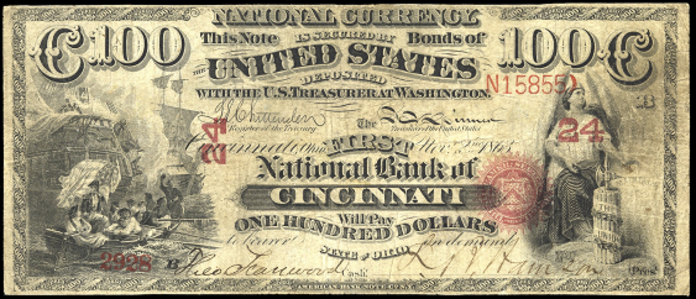One Hundred Dollar Notes › Nationals › 1863 One Hundred Dollar Original Series National Bank Notes › Kentucky Charters › 1863 $100 Louisville Kentucky Kentucky National Bank
Get Value Now
| Item | Info |
|---|---|
| Series | 1863 |
| Charter | #1908 Kentucky National Bank of Louisville, Kentucky |
| Year Chartered | 1871, 153 Banks Chartered |
| City Info | Louisville is the largest city in the Commonwealth of Kentucky and the 29th-most populous city in the United States. It is one of two cities in Kentucky designated as first-class, the other being the state's second-largest city of Lexington. Louisville is the historical seat and, since 2003, the nominal seat of Jefferson County. Source: Wikipedia |
| Similar Cities | If your note doesn't match try: 1. Louisville, Kentucky - First National Bank 2. Louisville, Kentucky - Second National Bank 3. Louisville, Kentucky - Louisville City National Bank 4. Louisville, Kentucky - Planters National Bank 5. Louisville, Kentucky - German National Bank 6. Louisville, Kentucky - Merchants National Bank 7. Louisville, Kentucky - Citizens National Bank 8. Louisville, Kentucky - Third National Bank |
| Seal Varieties | Red with rays |
| See Also | If your note doesn't match try: 1. 1863 $100 Compound Interest Treasury Note 2. 1864 $100 Compound Interest Treasury Note 3. 1863 $100 Gold Certificate 4. 1861 $100 Interest Bearing Note 5. 1863 $100 Interest Bearing Note 6. 1864 $100 Interest Bearing Note |
| Other Info | 1. Value depends on notes known for charter, condition and market demand. |
| Neat Fact | Abraham Lincoln signed the National Currency Act on Feb. 25, 1863 (Kelly, 5th Ed. P1) |
No Obligations Offers and Appraisals
Please submit a good photo or scan. It will be identified and evaluated. Understand there may be subtle differences between the image you see above and your note. Signatures, design, markings and note condition will determine the offer price. Notes in Uncirculated or better condition receive the best offers.
Appraisals can be estimated for wholesale and retail prices. Wholesale is what dealers typically pay. Retail is what a collector might pay. Retail is slightly higher in most cases.
Please visit this page for USA Paper Money Reference. Do not treat this page as a reference guide, it is for appraisal and acquisition purposes only.
